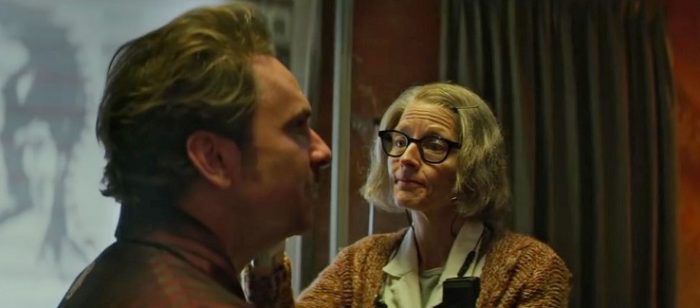
************************This review contains spoilers*********************
Set amidst a highly privatized American society in 2028 Los Angeles, Hotel Artemis takes us to a hospital of the same name; thirteen stories high and a specialized, members-only clientele consisting exclusively of criminals. Tonight, Hotel Artemis and its head of operations simply named Nurse (Jodie Foster) welcome in the French assassin Nice (Sofia Boutella), arms dealer Acapulco (Charlie Day), and bank robber brothers Honolulu (Brian Tyree Henry) and Waikiki (Sterling K. Brown). While a riot over privatized water erupts outside, the occupants of Hotel Artemis, both the expected and unexpected, force Nurse to decide whether to break her own rules and confront a past she tried to leave behind.
The overarching theme present in Hotel Artemis is that of self-realization and discovery. Our main character Nurse embarks on this journey most prominently. In the secretive environment of highly skilled, and wanted, criminals, Nurse is able to use the need for secrecy to bury the painful secrets of her past not only from clientele, but also her own conscience. The nexus of Nurse’s internal struggle with her demons was the tragic loss of her son from an apparent overdose. This event begun an out-of-control spiral for her life culminating in an alcohol addiction and loss of her medical license, which eventually led her to running Hotel Artemis on behalf of the “Wolf King” of crime (as portrayed by Jeff Goldblum) so that she could fulfill the part of her that still wanted to treat those in need medically. By never fully coming to terms with what happened, Nurse ensures that the tragedy of her son’s death will always firmly remain at the edge of her subconscious, and a weak point that leaves her vulnerable in a world where vulnerability endangers you. This is displayed throughout the film through random glimpses of flashbacks she has of her son’s body lying underneath an L.A. pier, and in one of the film’s plot points where Nurse is driven to break the hospital rules and treat an officer wounded in the riots outside, because she was a childhood friend of her son’s (Morgan, played by Jenny Slate).
Treating Morgan at the risk of everything she has salvaged in the wake of her post-tragedy breakdown brings Nurse to the realization that caring for others encapsulates who she is at her core. The film’s eventful night forces Nice and Waikiki to confront similar questions about their makeup as the hospital crumbles around them and become ever more dangerous. Nice comes to terms with her own commitment to brutality as one of the world’s best assassin’s, culminating in the contract killer performing an act of heroism and selflessness during the film’s third act, and Waikiki finding purpose and meaning in the absence of responsibility, particularly a sense of responsibility in having to take care of his younger brother. Facing adversity and pressurized situations has a way of forcing people to come to terms with who they are at their core, which Hotel Artemis attempts to explore. While this narrative is made clear in the film, the characters’ journey fails to resonate emotionally due to a failure to connect with them emotionally. Foster’s Nurse comes the closest, as she has the majority of the screen time and detailed backstory, but you never become fully invested in what happens to her, or anyone else.
This inability to connect is no fault of the cast, which is extremely talented and capable. Foster, Boutella, Brown, Day, Henry, Goldblum, Dave Bautista as Nurse’s second-in-command Everest, and Zachary Quinto as Goldblum’s son are all either on the rise as actors or have their names firmly etched in the stone of cinematic lore. Bautista and Quinto in particular stand out in their supporting roles with each playing an archetype they’re mastered, the fierce but lovable strongman and unhinged villain respectively. Day also provides some comedic relief as the jerk gun runner but the script and plot underutilize the talent at its disposal. The production design inside the hospital is another high-point for the film, at once very antique and steampunk-like while also making clear the futuristic elements of the time period. The cinematography however is very by-the-numbers and doesn’t equal the costume and set design we are treated too.
While Hotel Artemis’ inclusion of some thematic depth to compliment its action was appreciated, the seriousness was not balanced with the eye-popping action or fun irreverence that one would expect from this kind of film, or that its premise and setting contained the potential for. A secret, underground society of criminals who all utilize a network of secret hospitals that both patch them up and keep them safe from the watchful eyes of the authorities, until one night, some of the elite of their ranks become entrapped in one of the hospitals and have to shoot their way out while a riot occurs outside should have been a recipe for a more enthralling and action-packed film. The collection of on-screen talent is notable, the set and costuming are well done, and the concept is original. While more original films are needed in this day and age, originality in and of itself is not a substitute for a high quality story, and Hotel Artemis as a story doesn’t live it to what it potentially could have been. New and original concepts should be rewarded with theatrical viewings whenever possible, but what we’re presented with in this film may be better suited for a viewing at home on Netflix or Vudu.
Image: Global Road Entertainment

